Related Research Articles

A lute is any plucked string instrument with a neck and a deep round back enclosing a hollow cavity, usually with a sound hole or opening in the body. It may be either fretted or unfretted.

The theorbo is a plucked string instrument of the lute family, with an extended neck that houses the second pegbox. Like a lute, a theorbo has a curved-back sound box with a flat top, typically with one or three sound holes decorated with rosettes. As with the lute, the player plucks or strums the strings with the right hand while "fretting" the strings with the left hand.
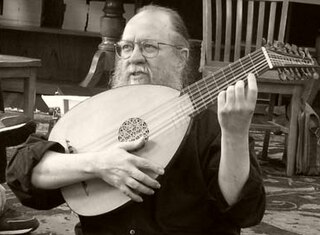
Patrick O'Brien was an American guitarist and lutenist born in New York. He was a recording artist, but was best known as a pedagogue in the field of early plucked instruments in America, and an expert in musicians' hand anatomy. He has worked with musicians on many instruments, reworking their technique around repetitive stress injuries and breakdowns of coordination.

Dame Carolyn Emma Kirkby, is an English soprano and early music specialist. She has sung on over 100 recordings.
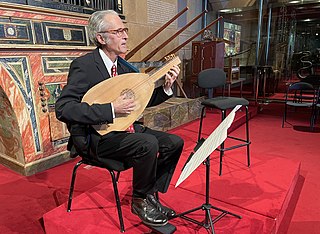
Hopkinson Smith is a Swiss-American lutenist and pedagogue, longtime resident in Basel, Switzerland.
A tombeau is a musical composition commemorating the death of a notable individual. The term derives from the French word for "tomb" or "tombstone". The vast majority of tombeaux date from the 17th century and were composed for lute or other plucked string instruments. The genre gradually fell out of use during the 18th century, but reappeared in the early 20th.
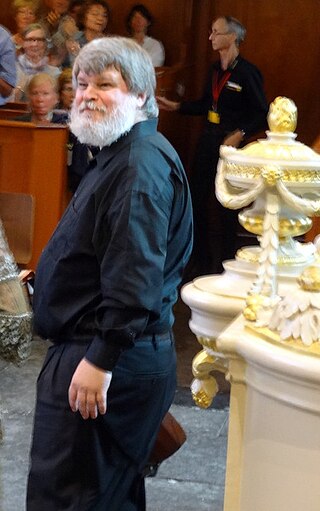
Paul Raymond O'Dette is an American lutenist, conductor, and musicologist specializing in early music.

Roman Mykhailovych Turovsky-Savchuk is an American artist-painter, photographer and videoinstallation artist, as well as a lutenist-composer, born in Ukraine. His musical works were published under various pseudonyms, including Johann Joachim Sautscheck.
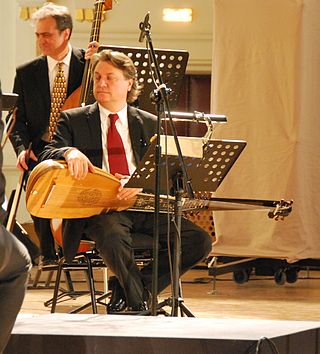
Luca Pianca is a Swiss musician-lutenist whose specialty is archlute. In 1985 he co - founded Il Giardino Armonico., a pioneering Italian early-music ensemble based in Milan. He has premiered works by the contemporary lutenist-composer Roman Turovsky-Savchuk at international festivals, and received numerous international awards for his recordings.

Jacopo Gianninoto is an Italian lutenist, guitarist and composer living in Bangkok, Thailand.
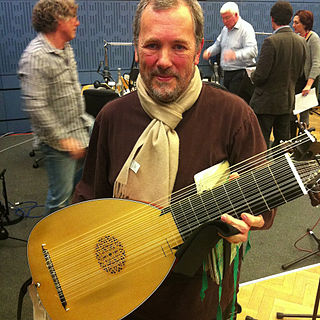
Nigel North is an English lutenist, musicologist, and pedagogue.

Vincent Dumestre is a French lutenist. In 1997 he founded the ensemble Le Poème Harmonique.
Paulo Galvão is a composer, lutenist, theorbist and guitarist. According to Dan Hill, Galvão has published "musical forgeries" for baroque guitar under the name "Antonio da Costa". Galvão's works have been performed by Marcello Vitale and Marco Meloni.

Rob MacKillop is a Scottish composer and multi-instrumentalist, specializing in lute, theorbo, vihuela, banjo, ukulele and both classical and Russian guitar. He is an important performer of Early Music in Scotland. He is also a photographer.
John H. Schneiderman is an American lutenist and guitarist born in Ithaca, New York, where his father was a member of the faculty of Cornell University. Schneiderman was introduced to music by his mother, who taught him to play the ukulele when he was six years old. He began performing at the age of nine, playing the banjo and fiddle at bluegrass festivals in California. Schneiderman received his undergraduate degree at the University of California, Irvine, studying guitar under Frederick Noad. He continued his studies at the Schola Cantorum in Basel, Switzerland with lutenist Eugen Müller-Dombois.
Rolf Lislevand, is a Norwegian performer of Early music specialising on lute, vihuela, baroque guitar and theorbo.
Jakob Lindberg is a Swedish lutenist, performing solo, in small and large ensembles, and also directing operas, using instruments of the lute and guitar families. He is known for the first ever recording of the Complete Solo Lute Music of John Dowland as well as for recording music never before recorded, with repertoire dating back to the Renaissance period.

Richard Stone is an American lutenist, music director, educator and music editor. He performs on lute and theorbo as a soloist and accompanist; he and Gwyn Roberts co-founded and co-direct Tempesta di Mare, The Philadelphia Baroque Orchestra; his musical editions are published by AR Editions and Prima la Musica; and he lectures and teaches lute, theorbo, continuo and performance practice for singers and instrumentalists at the Peabody Conservatory of The Johns Hopkins University.
Massimo Marchese is an Italian musician, lutenist, theorbist and recording artist.
Charles Hurel was a French Baroque composer, lutenist and theorbist active between 1665 and 1692.
References
- ↑ "A Great Night With Christopher Wilke". Archived from the original on 2016-09-27.
- ↑ "Christopher Wilke, Solo Baroque Lute". 2015-10-11. Archived from the original on 2016-09-27. Retrieved 2023-10-16.
- ↑ "The Lute Society of America – LuteFest 2010 Performers – Chris Wilke". www.cs.dartmouth.edu. Archived from the original on 2015-07-08.
- ↑ "Backstage Pass with Lutenist Christopher Wilke | WXXI". interactive.wxxi.org. Archived from the original on 2016-09-27.
- ↑ "Compositeur - Christopher Wilke". Archived from the original on 2016-09-27. Retrieved 2016-09-25.
- ↑ "L'Esprit Baroque".
- ↑ "Kairos". Concertzender | Klassiek, Jazz, Wereld en meer.
- ↑ "Sonoor".
- ↑ "Classical Guitar Alive! Play Lists".
- ↑ "Lutenist Christopher Wilke on Next Fretworks » Classical 101". delta.wosu.org. Archived from the original on 2016-09-27.
- 1 2 "Christopher Wilke CD release!". Archived from the original on 2016-10-21. Retrieved 2016-09-25.
- ↑ "Desperate Doors". 17 December 2015.
- ↑ Zuluaga, Daniel (2015). "ANONYMOUS, PAULO CARLO DURANT (Fl. C1745–1769), JOHANN ADOLF HASSE (1699–1783), JOSEPH HAYDN (ATTRIBUTED) (1732–1809), JAKOB FRIEDRICH KLEINKNECHT (1722–1794) GRACEFUL DEGRADATION: THE LAST LUTE SONATAS Christopher Wilke, thirteen-course lute Self-issue, no catalogue number, 2013; one disc, 62 minutes". Eighteenth Century Music. 12 (2): 251–253. doi:10.1017/S1478570615000135. S2CID 194715121.
- ↑ "Charles Hurel: The Theorbo Music. Christopher Wilke, theorbo".